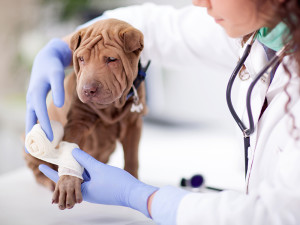5 Ways You Can Write Off Your Pet This Tax Season
Because in our world, nothing is certain except pets and taxes.

Share Article
Don’t kill the messenger, but it’s tax season. Take some deep breaths. No, your math skills probably haven’t improved much from last year, and no, we have no idea where you left all your forms and receipts — but believe it or not, there is some good news. You may be able to write off your pet in your taxes.
Before you pop the champagne, keep in mind that the possibility doesn’t apply to everyone. “There is limited availability to deduct pet expenses. Only in a few circumstances, we can deduct limited pet expenses,” explains Roxanne Hendrix, a certified public accountant (CPA) and a tax expert with JustAnsweropens in new tab.
And no, treating your pet as as your child doesn’t make them a kid in the eyes of the IRS. “Pets cannot be claimed as dependents, however, under any circumstances,” Hendrix confirms.
Whatever — they’ll come around eventually. Until then, there are other methods of getting tax credits for your pet. Below are five reasons you may be able to write off your dog or cat.

1. You’re a foster volunteer.
When you foster a pet, it opens up space in local shelters for more animals to be cared for. We can’t recommend it enough. It’s a selfless act that saves lives — and it can also save you money. “If you foster a pet for a nonprofit adoption organization, you may be able to write off unreimbursed expenses,” Hendrix says.
These write-offs could include pet food, cleaning products, medicine, crates, or vet bills. Driving expenses may even be applicable to certain situations, Hendrix advises, especially when volunteering for animal organizations.
“You can also deduct 14 cents per mile on any charity-related driving, excluding commuting expenses though,” she says. Of course, it wouldn’t be taxes if there wasn’t a vague caveat to temper the excitement. The CPA notes that only pets fostered from IRS-qualified 501(c)(3) organizations are eligible for these write-offs.
2. Your pet’s a service animal.
As previously mentioned, we can’t claim our animals as children. But if you look hard enough, you can find a loophole for anything. And there’s one here.
“Service animal-related expenses may be eligible for a tax write-off because your pet is providing a medical service to you,” Hendrix explains. This extends to emotional support animals in many cases, as well. She adds that you can write off any service animal medical expenses that exceed past 7.5 percent of your adjusted gross income. You’ll just need to prove that your pet provides a specific medical service to you.
3. Your pet is part of the family biz.
Though the IRS doesn’t consider them our children (can you tell we’re a little bitter about it?), some pets are able to contribute to the family trade. Folks with pets who help run operations may be entitled to various tax breaks, according to Christian Maldonado, the founder and CEO of the accounting firm Finsultopens in new tab.
“For business owners, pet expenses are deductible if they provide a service for the business,” he explains. This would include farm dogs who protect livestock from prey. In this scenario, the expenses needed to maintain the life of the dog would qualify as tax write-offs because they’re recognized as “necessary for the continued operations of the business in pursuit of income and growth,” Maldonado adds.
Other examples would include cats who conduct pest control for a business location or pets who are used in advertising on the company’s social media. In regard to advertising, you must be able to prove that they directly produced related income.
“For example, if your animal is a key central token to your YouTube channel that generates income for your business, it’s known as a ‘performance’ animal to the IRS as it is directly tied to producing income for the business so the stated expenses would qualify as write-offs,” Maldonado adds.
4. Your pet is an influencer.
It’s also possible that your pet is the breadwinner. If your dog or cat is the type of animal to have their own YouTube account, you may also qualify for a pet tax deduction because they still perform in a way that earns you income. As a result, you could potentially write off their expenses. This would include pets who have worked on a movie set or have competed in events that offered cash prizes.
However, the most likely scenario here is if your dog or cat is one of the 10,000-ish pet influencers I follow on Instagram. This would all fall under that performance animal designation. Just be sure to keep your books in order come tax season, Hendrix advises.
“If you have a ‘performance animal,’ make sure you keep records of all the related expenses,” she says. The records you keep will determine what you are able to claim and how much you are ultimately able to lower your tax liability.”
5. You donated to an animal organization.
Charitably supporting animal rescues and shelters is no different than donating to any other type of organization and is tax deductible all the same. Unfortunately, this does not apply to any charges made in the process of bringing your pet home.
“Shelters, rescues, and other legally formed pet-based charities are eligible as tax deductions. This does not include initial adoption fees for new pets if it’s directly correlated to you getting the animal in the exchange,” Maldonado notes.

Sean Zucker
Sean Zucker is a writer whose work has been featured in Points In Case, The Daily Drunk, Posty, and WellWell. He has an adopted Pit Bull named Banshee whose work has been featured on the kitchen floor and whose behavioral issues rival his own.
Related articles
![A woman with tattoos hugging her white cat in a cluttered, art-filled room]()
Cats, Priceless. Cat Parenthood, Not So Much
A rundown of the most common cat expenses.
![shiba inu snuggling on couch with woman]()
Money Talks: The Dollars of Dog Parenthood
We crunched some numbers and yup, they’re worth every penny.
![A puppy getting a wound dressed at the vet]()
Which Pet Insurance Company Is Right for You?
We compared the top insurers so you don’t have to.
![woman with new puppy]()
9 Unexpected To-Dos for New Pet Parents
Sound advice from seasoned dog and cat parents who have been there.
![French bulldog being examined at the vet via stethoscope]()
13 Tips for Saving Money at the Vet
Ways to lower your bill—without compromising your pet’s health.
![A woman in a yellow sweater and jeans sitting and petting the head of her gray cat eating dry food from the floor in her kitchen]()
How to Find Free Pet Food Near You
These community resources can help your pet get the food they need.








